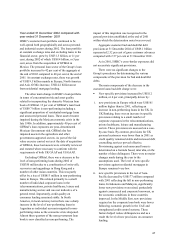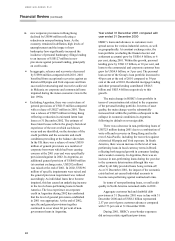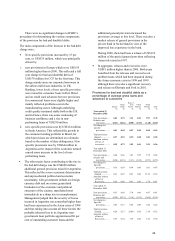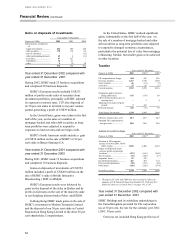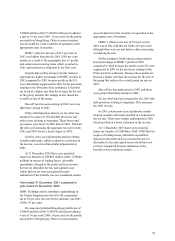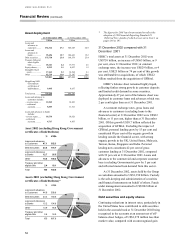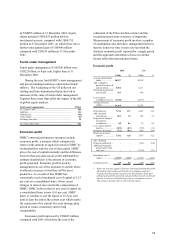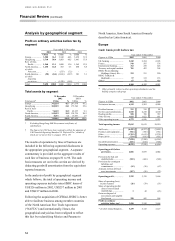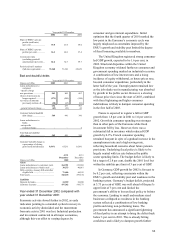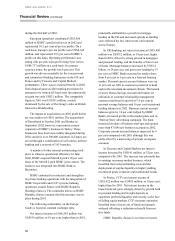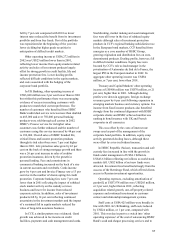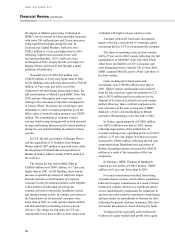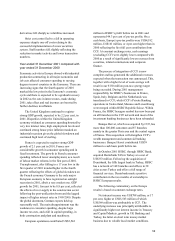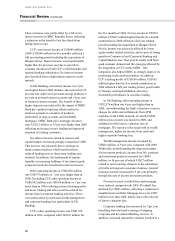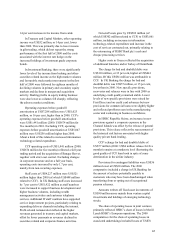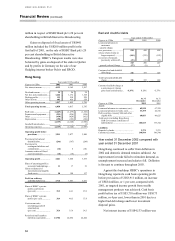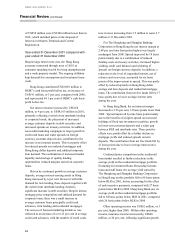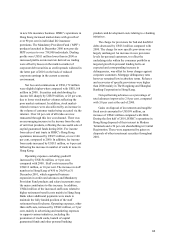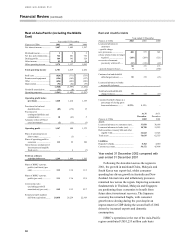HSBC 2002 Annual Report Download - page 59
Download and view the complete annual report
Please find page 59 of the 2002 HSBC annual report below. You can navigate through the pages in the report by either clicking on the pages listed below, or by using the keyword search tool below to find specific information within the annual report.57
fell by 7 per cent compared with 2001 as lower
interest rates reduced the benefit from its investment
portfolio and from free funds. Part of the portfolio
was repositioned at the beginning of the year into
lower yielding but higher grade securities in
anticipation of difficult credit markets.
Other operating income at US$6,272 million in
2002 was US$25 million lower than in 2001,
reflecting lower income from equity-market-related
activity and sales of investment products largely
offset by strong growth in credit facility, life and
income protection fees. Lower dealing profits
reflected difficult conditions in the equity markets,
and costs associated with the hedging of the
corporate bond portfolio.
In UK Banking, other operating income at
US$3,040 million was 2 per cent lower than in 2001
but within this performance there was encouraging
evidence of success in reaching customers with
products to match their current preferences. The
number of customers who benefited from HSBC
Bank’s individual service reviews more than doubled
to 485,000 and over 750,000 personal banking
products were sold through call centres in 2002.
HSBC’s Premier service for its higher value
customers was further enhanced and the number of
customers using this service increased by 44 per cent
to 182,000. Overall sales of HSBC branded life,
critical illness and income protection products
through its tied sales-force were 7 per cent higher
than in 2001. Life protection sales grew by 42 per
cent on the back of strong mortgage growth and there
was a 26 per cent increase in sales of creditor
protection insurance, driven by the growth in
personal lending. Fees and commissions in
commercial banking increased on the back of a rise
in current accounts and overdrafts. Cards income
grew by 6 per cent and Invoice Finance saw a 13 per
cent rise in the number of clients opting for credit
protection. Corporate banking fees were 7 per cent
lower than in 2001 reflecting the impact of subdued
stock market activity on the custody services
business and lower fee income from reduced
corporate activity. In addition, sales of investment
products fell by 14 per cent reflecting continued
uncertainty in the investment markets and the impact
of a sustained fall in equity markets reduced the
value of long-term assurance business.
In CCF, a similar pattern was evidenced. Good
growth was achieved in fee income on credit
facilities, payments and cash management and cards.
Stockbroking, market making and asset management
fees were all lower in the face of subdued equity
markets although sales of investment protection
products in CCF’s regional banking subsidiaries rose.
In the European bond markets, CCF benefited from
synergies as a core member of HSBC Group,
growing origination and distribution fees on euro-
denominated products. Dealing profits, however, fell
in difficult market conditions. Equity fees were
boosted by CCF’s role as lead manager in the
privatisation of Autoroutes du Sud de la France, the
largest IPO in the European market in 2002. In
aggregate other operating income was US$84
million, or 7 per cent, lower than 2001.
Treasury and Capital Markets’ other operating
income at US$400 million was US$70 million, or 21
per cent, higher than in 2001. Although dealing
profits were down in aggregate, foreign exchange
revenues grew by 6 per cent following expansion in
emerging markets business and currency options. Fee
income from fixed income products also benefited
strongly from the continued alignment with HSBC
corporate clients and HSBC achieved number one
ranking in bond issuance with UK and French
corporates in all currencies.
This was offset by the costs of interest rate
swaps used as part of the management of the
corporate bond portfolio. In addition, equity swap
activity generated dealing losses, although these
were offset by a rise in dividend income.
In HSBC Republic (Suisse), transaction and safe
custody fees increased in line with the growth in
funds under management of US$4.1 billion to
US$45.6 billion reflecting net inflows as world stock
markets fell. US$2 billion of net new funds were
attracted. Investment fees benefited strongly from the
success of the Hermitage Fund, which offered clients
access to Russian investment opportunities.
Operating expenses, excluding amortisation of
goodwill, at US$7,878 million were US$265 million,
or 3 per cent, higher than in 2001, reflecting
acquisition related growth, one-off property related
expenses and continued investment in customer
contact and relationship management systems.
Staff costs at US$4,425 million were broadly in
line with 2001. In UK Banking, staff costs reduced
by US$24 million, or 1 per cent, compared with
2001. This was due in part to a switch into ‘other
operating expenses’ of the cost of outsourcing HSBC
Bank’s cash and cheque processing services and to


